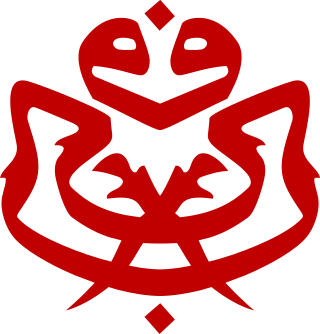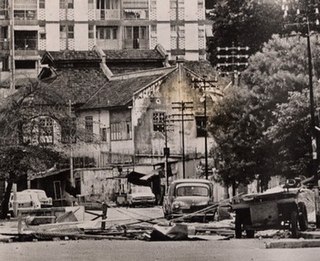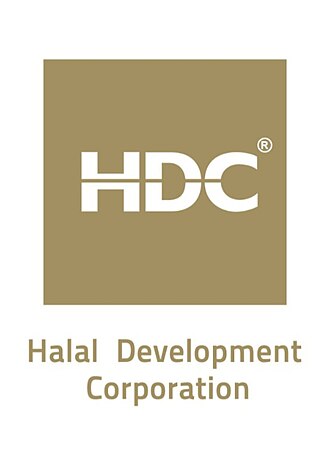Bumiputera or bumiputra is a term used in Malaysia to describe Malays, the Orang Asli of Peninsular Malaysia, and various indigenous peoples of East Malaysia. The term is sometimes controversial. It is used similarly in the Malay world, Indonesia, and Brunei.

The civil service is a collective term for a sector of government composed mainly of career civil service personnel hired rather than elected, whose institutional tenure typically survives transitions of political leadership. A civil service official, also known as a public servant or public employee, is a person employed in the public sector by a government department or agency for public sector undertakings. Civil servants work for central and state governments, and answer to the government, not a political party.

The United Malays National Organisation ; abbreviated UMNO or less commonly PEKEMBAR, is a nationalist right-wing political party in Malaysia. As the oldest national political party within Malaysia, UMNO has been known as Malaysia's "Grand Old Party".

The 13 May incident was an episode of Sino-Malay sectarian violence that took place in Kuala Lumpur, the capital of Malaysia, on 13 May 1969. The riot occurred in the aftermath of the 1969 Malaysian general election when opposition parties such as the Democratic Action Party and Gerakan made gains at the expense of the ruling coalition, the Alliance Party.
Article 153 of the Constitution of Malaysia grants the Yang di-Pertuan Agong responsibility for "safeguard[ing] the special position of the 'Malays'(see note) and natives of any of the States of Sabah and Sarawak and the legitimate interests of other communities" and goes on to specify ways to do this, such as establishing quotas for entry into the civil service, public scholarships and public education.
The social contract in Malaysia is a political construct first brought up in the 1980s, allegedly to justify the continuation of the discriminatory preferential policies for the majority Bumiputera at the expense of the non-Bumiputera, particularly the Chinese and Indian citizens of the country. Generally describing the envisaged 20-year initial duration of the Malaysian New Economic Policy, proponents of the construct allege that it reflects an "understanding" arrived at – prior to Malaya's independence in 1957 – by the country's "founding fathers", which is an ill-defined term generally taken to encompass Tunku Abdul Rahman, Malaysia's first Prime Minister, as well as V. T. Sambanthan and Tan Cheng Lock, who were the key leaders of political parties representing the Malay, Indian and Chinese populations respectively in pre-independence Malaya.

The National Principles is the Malaysian declaration of national philosophy instituted by royal proclamation on Merdeka Day, 1970, in reaction to the 13 May race riots, which occurred in 1969. The riots proved at that time that Malaysian racial balance and stability was fragile. Immediately thereafter, the Malaysian government sought ways to foster unity among the various races in Malaysia. Therefore, the National Principles were formed.
Law enforcement in Malaysia is performed by numerous law enforcement agencies and primarily the responsibility of the Royal Malaysia Police. Like many federal nations, the nature of the Constitution of Malaysia mandates law and order as a subject of a state, which means that local government bodies also have a role to play in law enforcement, therefore the bulk of the policing lies with the respective states and territories of Malaysia. Below are some of the law enforcement bodies and agencies of Malaysia.
In Malaysian politics, the Malay Agenda is a concept related to the ideal of ketuanan Melayu. Although it did not feature in public discussion for much of the 20th century, in the early 2000s, it came to prominence due to its usage in the discourse of several politicians from the United Malays National Organisation (UMNO), the leading political party in Malaysia. The Malay Agenda is closely related to the UMNO, which sees itself as the guardian of the Malay ethnic group in Malaysia.
Malaysia is a multi-ethnic country, with a predominantly Muslim population. Racial discrimination is embodied within the social and economic policies of the Malaysian government, favouring the Malays and in principle, the natives of Sabah and Sarawak. However, in practice, the natives of Sabah and Sarawak do not benefit much from these policies, with natives of Sabah and Sarawak composing the bulk of bottom 40% income cohort of Malaysia. Rather, it is the Malays that obtain heavily subsidised education in local universities and make up the bulk of these universities, including in terms of employment. In fact, the resources of Sarawak have been exploited for decades, with the Malaysian government enriching governmental officials and their associates. The concept of Ketuanan Melayu or Malay supremacy is accepted by the Malay-majority political sphere.

The Chief Secretary to the Government is the most senior officer in the Malaysian Civil Service, secretary to the Cabinet of Malaysia and secretary-general of the Prime Minister's Department.

The sixth Sarawak state election was held between Friday, 27 September and Saturday, 28 September 1991. This election elected 56 state representatives into the Sarawak State Assembly. This election saw 72.8% of the eligible voters to cast their votes.

The Prime Minister's Department is a federal government ministry in Malaysia. Its objective is "determining the services of all divisions are implemented according to policy, legislation / regulations and current guidelines". It is headed by the Prime Minister of Malaysia followed by other Minister in the Prime Minister's Department. The Department consists of the Prime Minister's Office, the Deputy Prime Minister's Office and more than 50 other government agencies and entities. The Prime Minister's Department was established on July 1957. Its headquarters are in Perdana Putra, Putrajaya.
The Malaysian order of precedence is a hierarchy of important positions within the Government of Malaysia. It has no legal standing but is used by ceremonial protocol. The order of precedence is determined by the Federal Order of Precedence issued by the Prime Minister's Department. The latest one was issued on 13 November 2014. Unless otherwise noted, precedence among persons of equal rank is determined by seniority. As a general rule, spouses share the same rank with another and a person with two positions will take the highest one.

The Ministry of Investment, Trade and Industry, abbreviated MITI, is a ministry of the Government of Malaysia that is responsible for international trade, industry, investment, productivity, small and medium enterprise, development finance institution, halal industry, automotive, steel, strategic trade. The ministry has its headquarters located at Menara MITI on Jalan Sultan Haji Ahmad Shah in Kuala Lumpur and the building is also a component of Naza TTDI’s 75.5-acre KL Metropolis, a mixed development that is envisioned to be the International Trade and Exhibition District for Kuala Lumpur. It is one of the three ministries that has not moved to Putrajaya.

Halal Development Corporation Berhad, or HDC, is a Malaysian federal government agency mandated as the custodian of Malaysia's Halal economy, and featured as a trusted partner in the Halal business. Its mission is to generate opportunities for the community of stakeholders within Malaysia's Halal ecosystem.

Malaysians are citizens who are identified with the country of Malaysia. Although citizens make up the majority of Malaysians, non-citizen residents and overseas Malaysians may also claim a Malaysian identity.
Shared Prosperity Vision 2030, is a government blueprint released in 2020 by the Government of Malaysia for the period of 2021 to 2030 to increase the incomes of all ethnic groups, particularly the Bumiputera comprising the B40, the hardcore poor, the economically poor, those in economic transition, Orang Asli, Sabah and Sarawak bumiputeras, the disabled, youths, women, children and senior citizens.
Department of Islamic Development Malaysia or popularly known as JAKIM, is a federal government agency in Malaysia that administers Islamic affairs in Malaysia.








